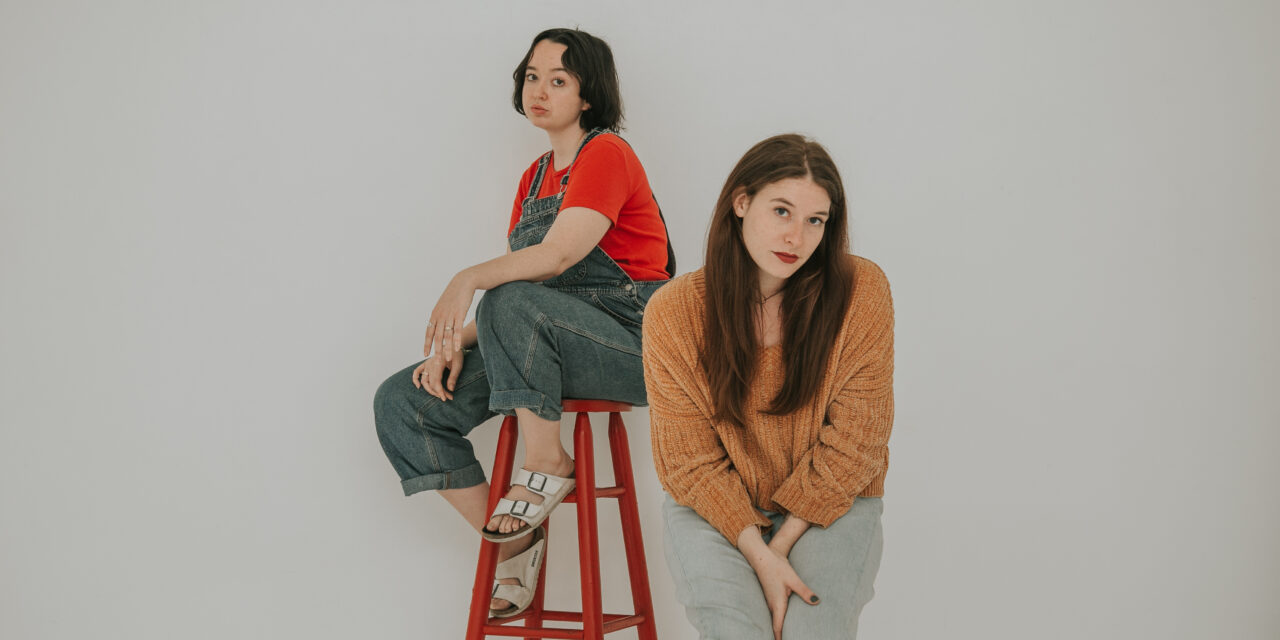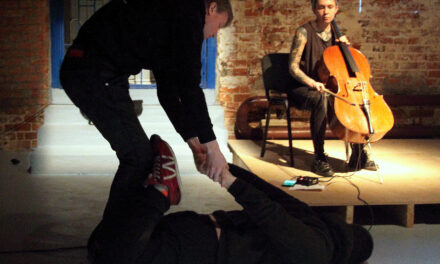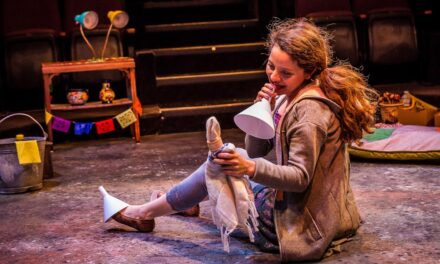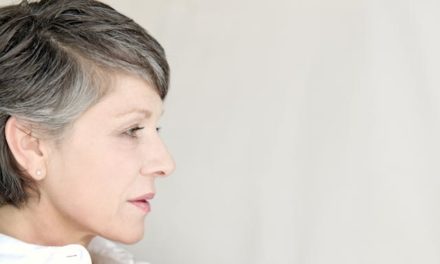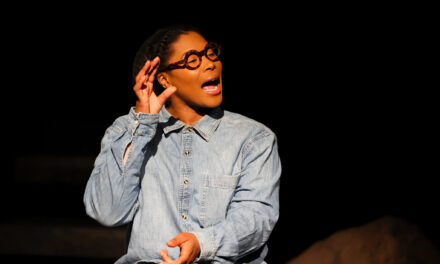Normal Ave is setting out to nurture a community of new and diverse voices and to make theater more accessible for artists and audiences. An up and coming New York City theater company, it recently started NAPSeries, an annual new play festival that’s free and open to the public, and a donation dashboard, for people to sponsor tickets to shows for those who can’t afford them. For its 2019-2020 season, Normal Ave will feature two world premieres. The first of these is Of the woman came the beginning of sin and through her we all die, a play about the dangers of commercializing millennial femininity. Written by Lily Houghton and directed by Kylie M. Brown, it focuses on four femmes who are bound together through their workplace, a windowless basement occupied by Free People, the American bohemian apparel retail store. People who are femme or non-binary comprise the entire crew of the production of Of the woman, which begins performances on October 3.
Playwright Lily Houghton and director Kylie M. Brown sat down with The Theatre Times to discuss Of the woman and the journey that they’ve taken to bring the play to Normal Ave.
How did you two meet and begin collaborating?
LH: We both grew up in theater families. We probably met multiple times when we were younger that I don’t remember. And so we were at- I think it was a Signature opening that was in the new space. I was like 14 or 15. And Kylie was about to go to college. And so we got introduced- officially introduced by this director named Patricia McGregor, who’s an incredible director. And she was at the opening and she was just sort of, “you guys should know each other. If you haven’t met, that’s really odd.” I feel like I’d always seen Kylie in rooms, but had been too much of a teenager to like, say anything. But we really reconnected after I graduated, because Kylie was working as a director and I really wanted to work with her. And then also I started working as a playwright. So I think Kylie saw me more as like, “not 14,” and we got coffee.
KB: For me, our narrative starts with Patricia McGregor. And it got fueled with a long coffee lunch. Our coffee date was like three hours long.
LH: We had like four lattes or something ridiculous.
KB: One of those moments where you know, and you’re like, “Okay, this is it.”
LH: I consider Kylie my sister. I hope she feels the same way. (Laughs)
KB: Oh yeah.
LH: And I think we both feel really comfortable with being, “Yes and no” to each other. It’s like we’re family. So that’s made for very good collaboration, because we’re not trying to protect each other. And, you know, we just work really well together.
How did the play come about?
KB: This piece has grown off of the goodwill of actors. I’d never seen Lily work before. So it was really, really interesting because we would come in the first day, we literally sat around the table and are like, “I’m Kylie. I’m an Aquarius. I like coffee with cream and three Splenda,” and then talk about it. Then we would start talking about kind of femme aspects of our life. Because that was the one thing that united us was we were all effeminate-identifying. And so what Lily did was listen, and then she’d bring in these monologues and that’s where a lot of the show started, was in confessionals. The play has got these confessionals at the center. Where the women confess a sin. And those were brought out of real things that we were going through and talking about and dealing with. And the shape of the piece has been honed by that, has been honed by real experience and real actors. So it’s like, you know, “I feel I identify with this, or this makes me think of this,” and the play keeps changing in that way. Which has been really, really fun to watch. That’s kind of how it’s been shaped.
LH: I think of settings or locations first when I’m writing a play. And I came in, I knew I wanted to write something for me and Kylie to work on. And I also sort of have to brew on an idea for a play for a while before I actually write it. I have very unhealthy writing patterns where I’m not a writer that wakes up every day and writes, by any means. Unfortunately. I wish I was, I’m someone who has to dream about and think about and write my iPhone notes about a play. And then in like, a week, I write it off. So that’s what it’s like, I have these sporadic episodes, and my first job out of college, my day job between rehearsal was at a Free People. Everything that I write, there’s definite morbid aspects. I’ve always been really interested in cults, I’ve always been really interested in true crime. So I thought of this idea that I wanted to write a play in the basement of Free People. And I wanted there to be some sort of cult in it, that happens. And this idea that it’s like a quote-unquote “feminist” cult that turns out to be… complicated, because of the location that it’s at. And because of the privileges that come at a place, like working at a Free People where everyone wears beautiful slip lingerie dresses to work and looks effortlessly cool. They’re not working there to make money. They’re working there to get the 40 or 50% off discount and then go out clubbing.
Did anything else inform the play dramaturgically? And if so, what did you research or look to for inspiration?
KB: Bible stuff. Oh, yeah. We’ve since kind of pulled back because we’ve had a year and a half to develop this. We’ve had phases of this, which I think have been really helpful. The first phase was- it’s based on the story of Adam and Eve. And that was the first phase which I think gave us a nice structure for it. And dramaturgically gave me a way into seeing what Lily was trying to do. And also understanding how we narrative-ize, females, Eve is the first kind of history story of a woman and she is the full blame of the story, which I find really interesting. So we did that.
LH: That’s where the title comes from.
KB: Yeah. And that’s also such a great, strange title. We were like, “Oh, do we all die because of the woman? Interesting.” And then we pulled away from it. And we were like, “No.” But there’s still some hints of it. And in this draft of the play, there’s threads of it that I’m picking up on. It starts as a narrative context. It’ll be up to the audience, I think, a lot, on how blamed, and how intelligent these women are onstage. But I think at the end of the day, they are very intelligent and know these stories, and they know, and they are fighting against these narratives that have been put on us by the world around us, and by the hundreds of years of interacting with men and interacting with the culture around us. And they are trying to fight it. But also in fighting it, what that looks like, through the lens of working at a Free People and what they are ultimately able to do. So there’s some text that still features that. But otherwise, it’s got some religious imagery, threaded in kind of to talk about this idea of blame. And where a woman’s place in culture has historically been and may continue to be or will hopefully not be.
LH: Yeah, there’s also a lot of astrology stuff in here. I read a lot of witchcraft books. There’s everything. Every part of this play is season based. So each of the four main girls is based off of a season and their flowers. Yeah. It’s Bluebell, Pumpkin, Sweet Pea, and Bleeding Heart. And those are all flowers. So you’re going to be like, “This person’s crazy.” Yeah, they are flowers that bloom during different seasons. So each represents a different season. And that also goes back to the idea of retail. So retail is completely seasonal based. So it’s this idea of like, “the retail cycle.”
The play has had a few workshops and staged readings. How have those influenced the process?
KB: Initially it was in specifying the characters over time. Lily was pretty clear about the things that she wanted to explore with this piece. In the last big round of development, I think the idea of privilege came in a little more heavily. We heard the reading, we had new actors so that we were hearing their voices and roles for “new” times. And Lily and I went home and the first thing she said to me was, “I just feel like there’s privilege. That everyone has a certain level of privilege. And no one was calling it out,” and then she brought in this new thing the next day, that was like, “everybody calling out each other’s privilege, and then that space completely imploding on itself.” Which is exactly what kind of happens as we get to the standstill point of like, “You’re privileged!” “No, I’m privileged!” Instead of actually hearing that, we go into a place of defensiveness instead of change. Which I think was something that was really, really exciting to me about the new round of development. That what this play was exploring was people who are desperately trying to change and don’t know how, or don’t have the toolbox, or haven’t actually been given the toolbox to change. They are actually trying. These women are making space for self improvement. But even with that, even at their best, they’re still not able to do that. We kind of started to put our finger on that in the last workshop. And that just got honed over time, it got more specific because the women, the more actors you get in a room to play one role or two in conversation with each other, the more expansive the conversation gets about femininity. Then it’s not about one person’s experience. It’s like, “Okay, what are we all having in common? And how can we figure out how this character can still have that intention, and how those can be countered, but those can both be truthful in the grounded, real experiences of our lives?” These characters, we’ve had a structure and we’ve just carved out their humanity over a year and a half in a really wonderful way that I’m very, very proud of.
You’re making theater by and for millennials and young adults, but theater in New York isn’t always welcoming to them. Do you have any hopes for how theater communities will grow and change over the next few years?
KB: You make spaces for young actors and young artists, and we will come and we will make art. There are not many spaces for that. And some of the spaces that are in existence are very problematic, and take advantage of those actors. And we are artists, and are taught to believe that our art should not be paid for, that we are privileged to be doing art, which is true, but it is also a job. And tt is hard to have respect or self-respect in some places that teach us not to respect ourselves. At places like EST (Ensemble Studio Theatre), luckily, I think there’s a lot of mutual respect. There’s a lot of love, there’s a lot of goodwill. So you meet a lot of other young artists, I’ve met a lot of our actors and other actors at ST (Signature Theatre). And we create those relationships. And then with this, Lily and I were pretty active about; we want people that have not have not had their break, who maybe haven’t had a Broadway gig, but definitely should. Because the thing is, there’s enough of that. And I’ve gone to enough shows where you can tell actors aren’t getting paid. And we just wanted a good space, that was good will, good love. We respect their schedule, they are allowed to have day jobs. So our entire rehearsal schedule is dependent on their day job.
And for audiences?
LH: How do you make theater accessible to everybody? But also, how do you then say, “We’re making a mission to do this?” And it’s not just like, “Oh, that was one season of that.” No, we have to continue to do that. Because that’s what the world is. So it’s the thing my dad said, always, his dream theater audience and what his goal was, is if you could take any New York, busy subway car, and take whoever is in that subway car, and plop it in a theater, that diversity of people on the subway, who’s going where, who’s going to work, whatever, that was his dream audience. And that’s sort of what I carry on too, that would be my dream audience.
This post was written by the author in their personal capacity.The opinions expressed in this article are the author’s own and do not reflect the view of The Theatre Times, their staff or collaborators.
This post was written by Andrew Agress.
The views expressed here belong to the author and do not necessarily reflect our views and opinions.

